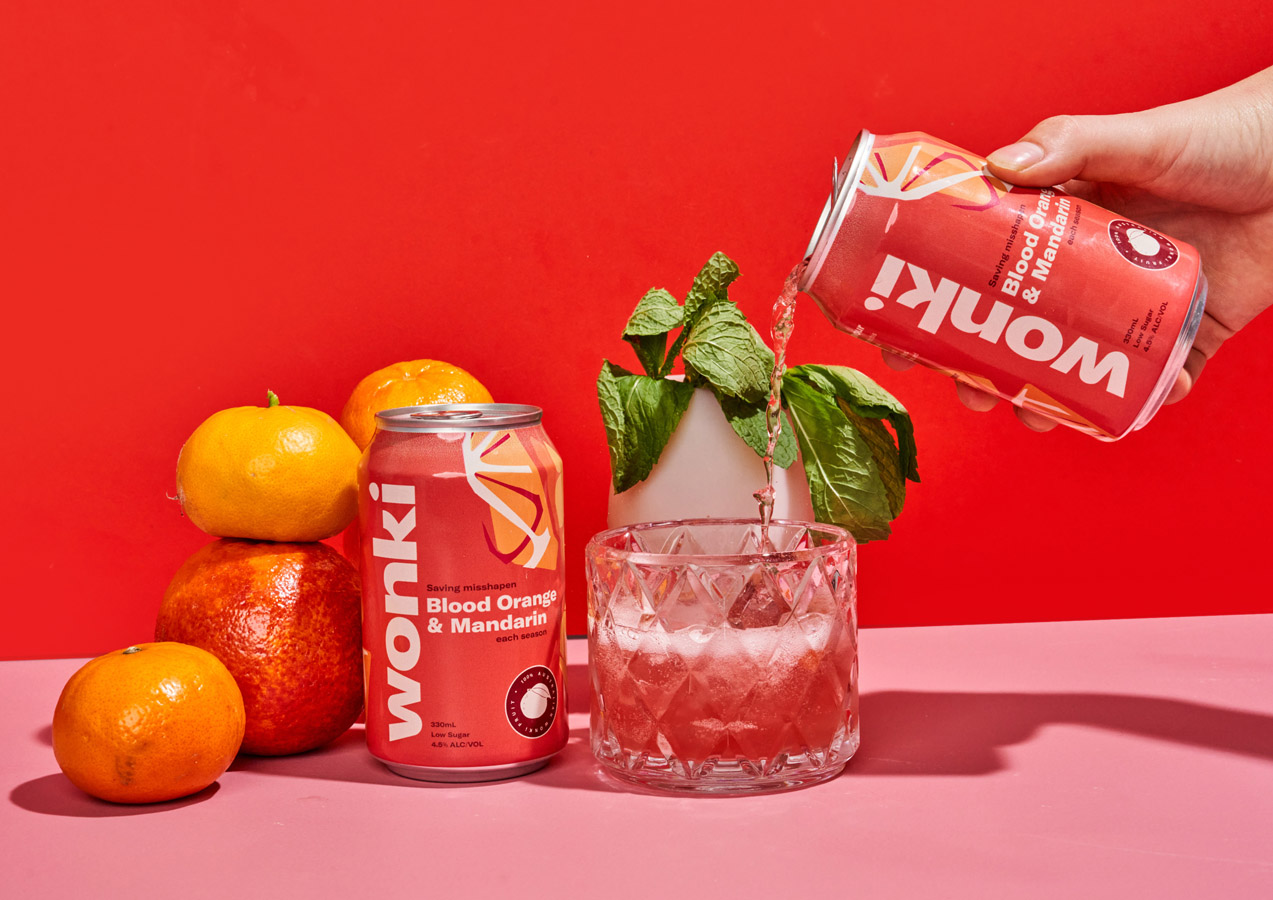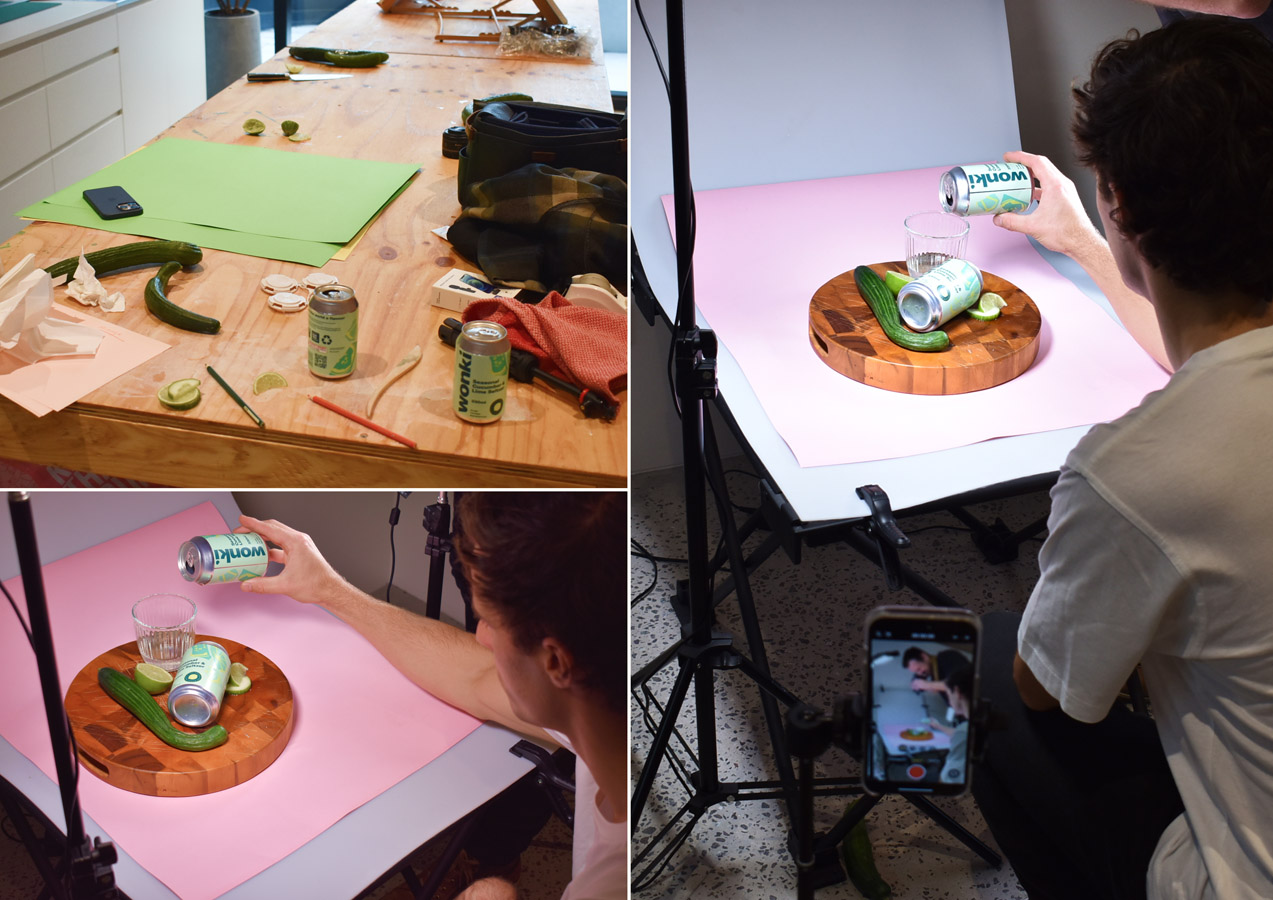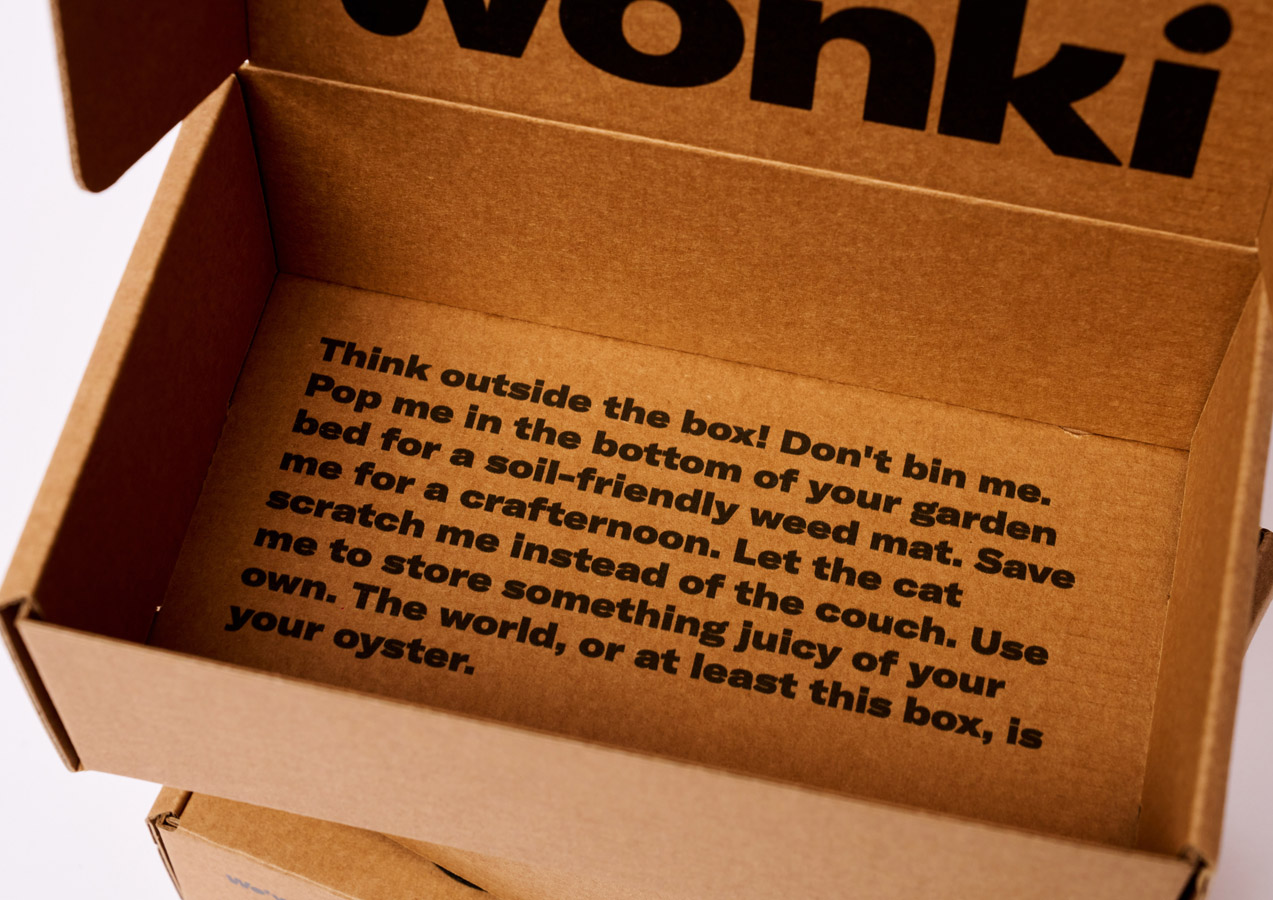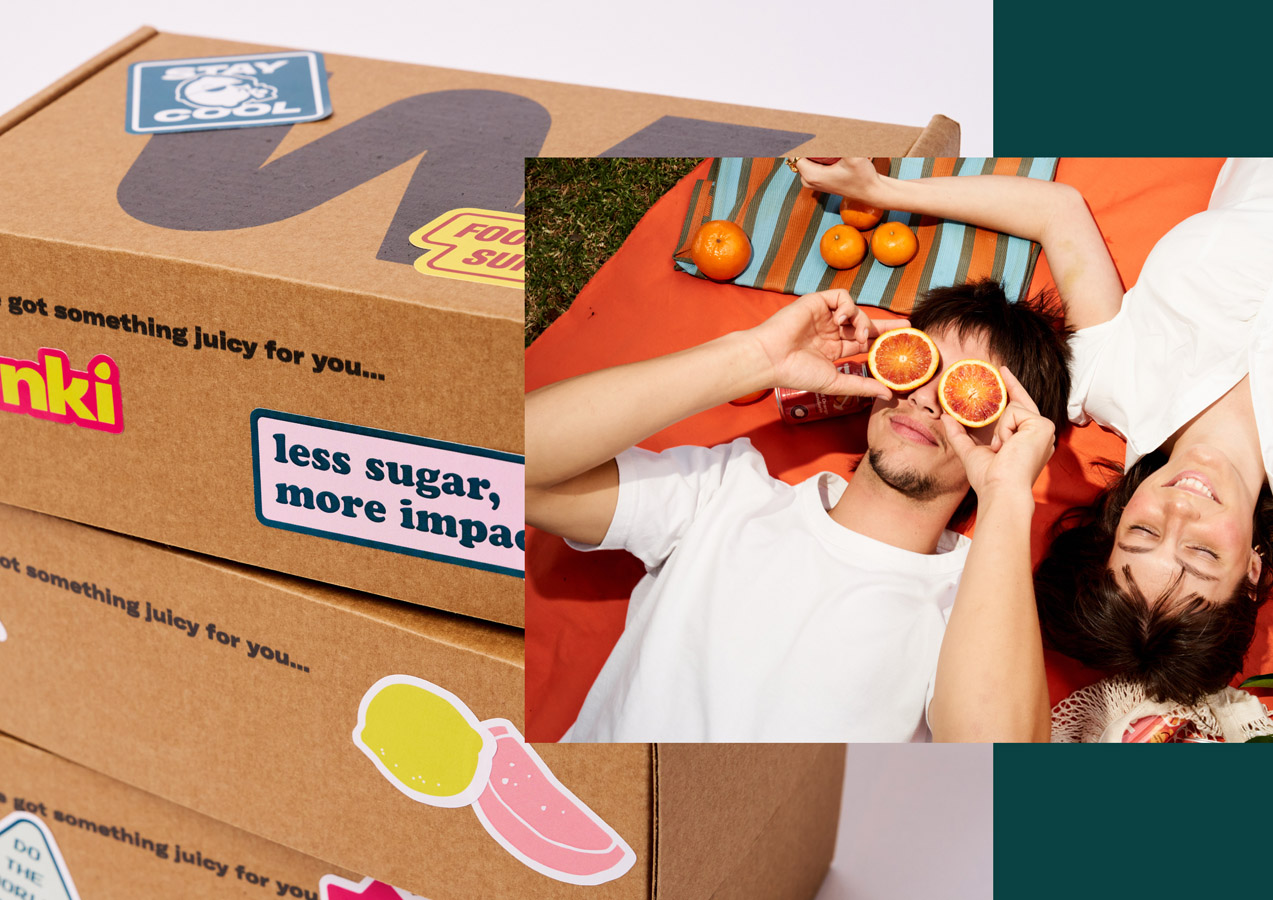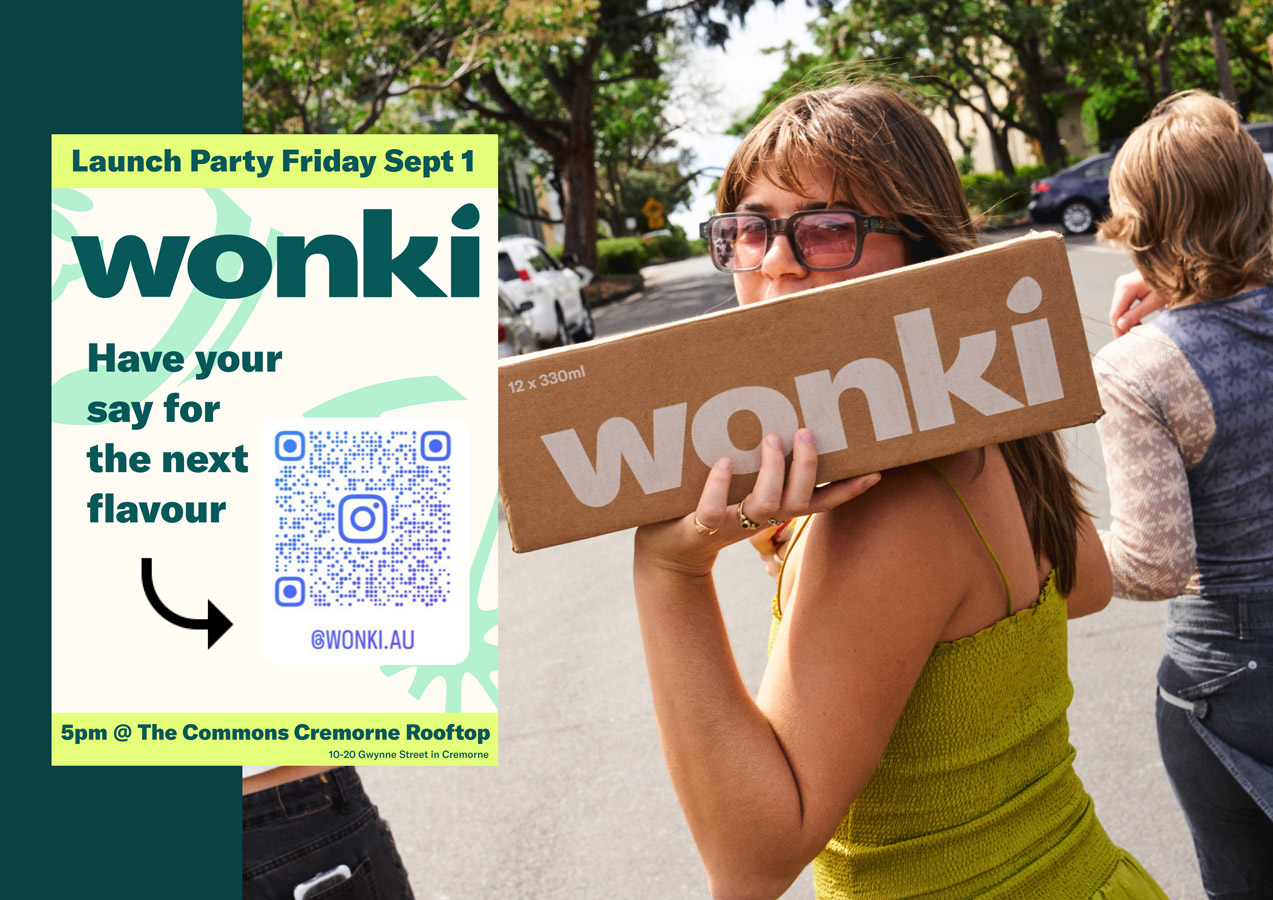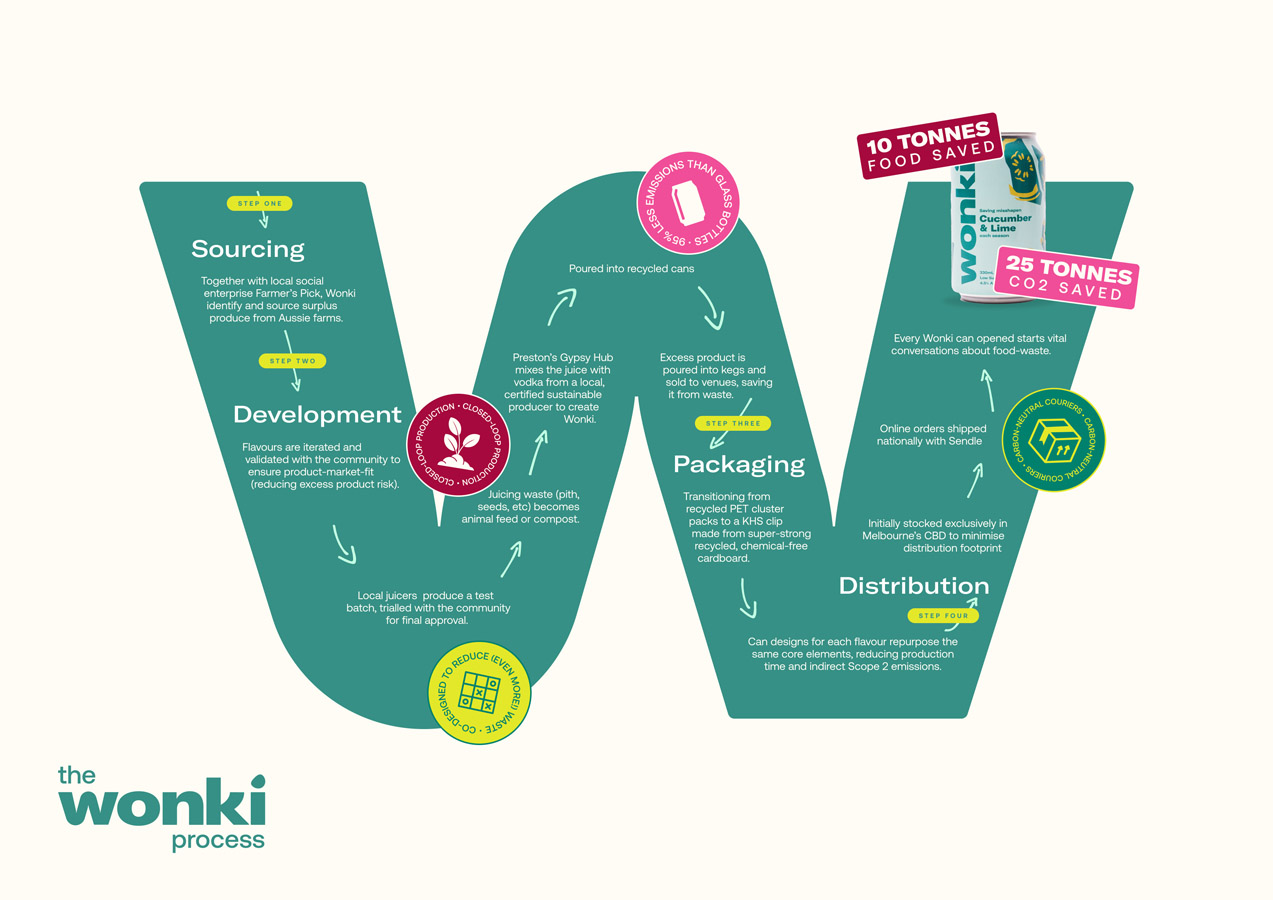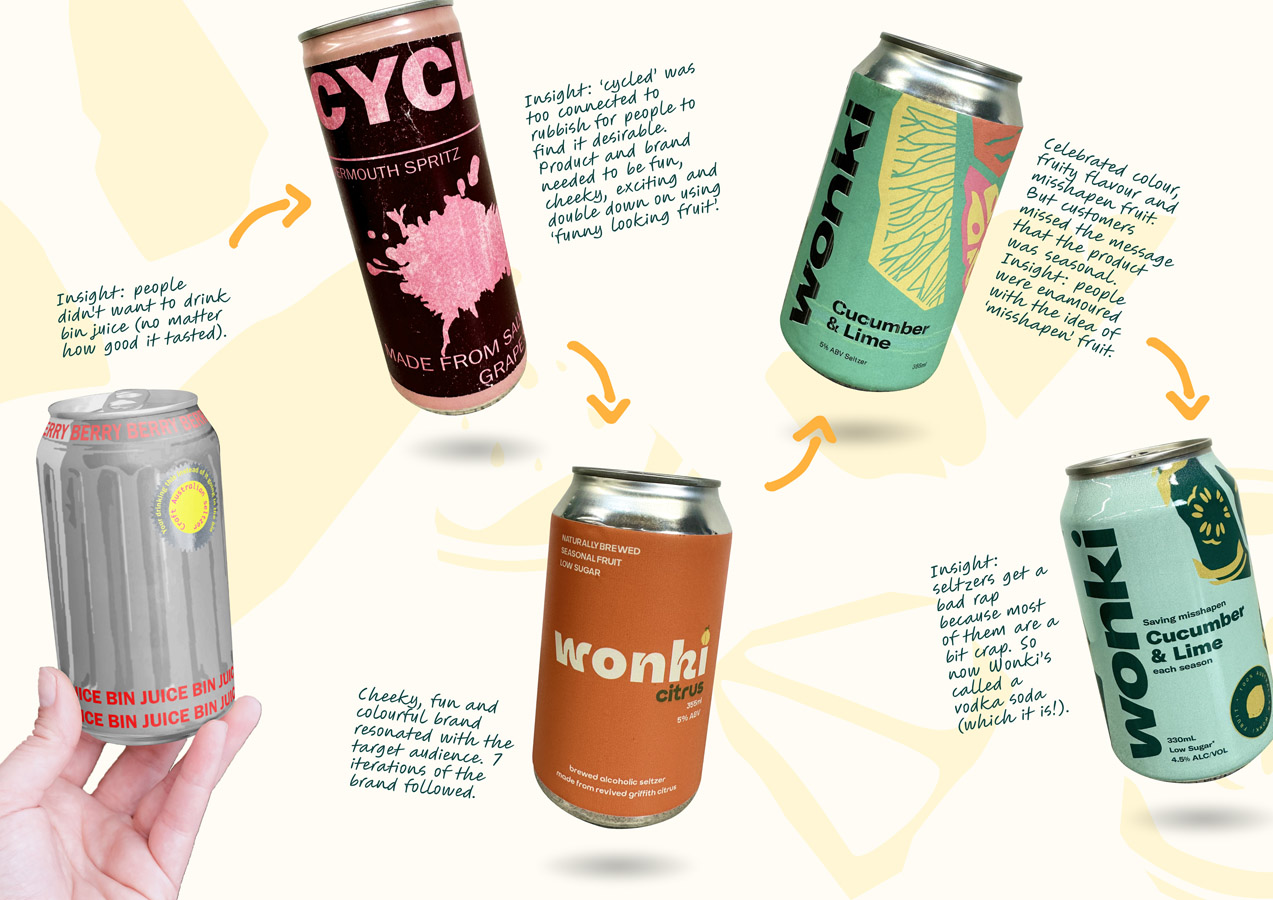Wonki’s design features extend beyond the beautiful brand into a consciously-created product with sustainability at every step.
Sourcing:
Together with local social enterprise Farmer’s Pick, Wonki identifies seasonal surplus produce from Aussie farms that require timely saving.
Development:
Flavours are iterated and validated with the community to ensure product-market-fit (reducing excess product risk). Local juicers then produce a test batch, trialled with the community for final approval. Juicing waste (pith, seeds, etc) becomes animal feed or compost in a closed-loop. Preston’s Gypsy Hub mixes the juice with vodka from a local, certified sustainable producer to create Wonki. Poured into recycled cans (95% less emissions than glass bottles). Challenge: Variable juice yield - excess product is filled into kegs and sold to venues, saving it from waste.
Packaging:
Initially cluster-packed using recycled PET, Wonki is transitioning to a KHS clip - made from robust cardboard removing the need for toxic ‘wet-chemicals’ which prevent effective recycling. Wonki’s can designs for each flavour repurpose the same core elements, reducing production time and indirect Scope 2 emissions.
Distribution:
Initially stocked exclusively in Melbourne’s CBD to minimise distribution footprint. Online orders shipped nationally with Sendle a carbon-neutral courier. Every Wonki can opened starts vital conversations about food-waste.
Wonki
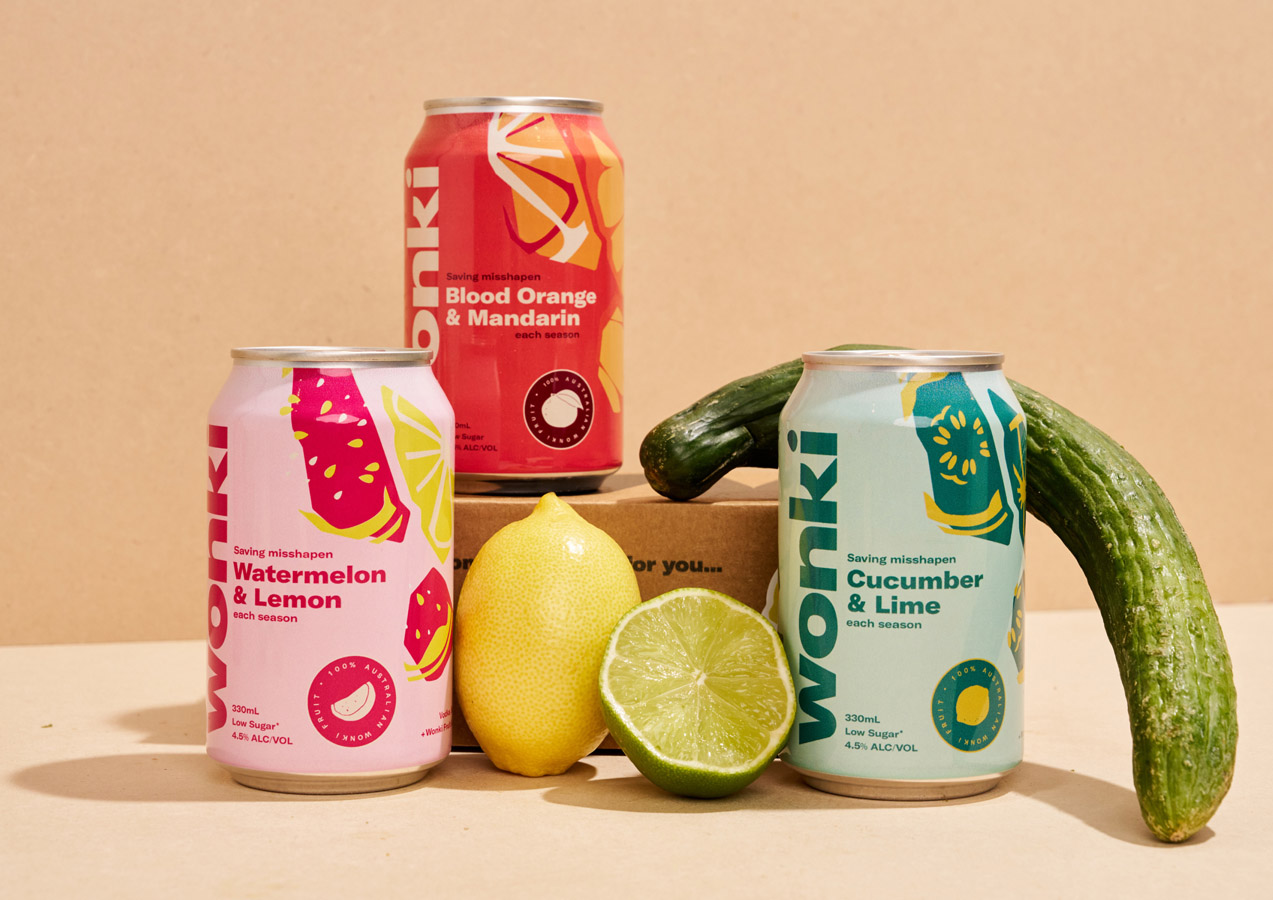
Wonki saves misshapen produce from Aussie farms and smooshes it into sustainable, juicy, seasonal vodka sodas. Cheers to that!
Wonki is tackling Australia’s huge food waste issue and supporting local farmers, one delicious drop at a time. Wonki purchases misshapen but just-as-delicious seasonal produce destined for the waste heap, and turns it into flavour-filled alcoholic drinks that are good for the planet and parties alike.
Design Brief:
Wonki’s challenge was two-fold: How could they save food while supporting local farmers and businesses struggling in current economic conditions? It’s human nature to choose beauty. Symmetry puts us at ease and helps us avoid danger. But our obsession with looks has created an ugly problem. Each year, Australia wastes over 7.3 million tonnes of food. One third of that is perfectly imperfect produce deemed ‘too ugly’ for supermarket shelves. It’s costing our planet and our wallets – with total food waste costing the Australian economy around $36.6 billion each year. Not to mention the livelihoods of Aussie farmers.
This project was developed by:
- Wonki
- Shadowboxer
Design Process
Design Excellence
Aligned with UN SDG No.12: Responsible Production and Consumption, Wonki’s ‘nothing wasted’ mantra informs all design choices. Co-design and Collaboration: By collaborating with Farmer’s Choice to liaise with farmers and identify surplus produce, Wonki are able to maximise both the food saved and the dollars back in farmer’s pockets.
Wonki’s community are engaged to iterate and approve flavours and packaging. Every flavour goes through four rounds of community testing. This ensures product-market fit and reduces excess stock risk (first releases of all flavours sold out!). Before Wonki was Wonki, over 150 one-on-one sessions on our name were held.
Framework:
Recipes:
Every flavour is built from a base framework (refined over 6 months and 25 iterations). This reduces R&D for each batch leaving more time (and money) to spend saving food and supporting farmers. It also enables Wonki to be responsive to sudden produce surplus by rapidly producing new flavours. Similarly, all packaging repurposes the same elements, reducing production and indirect Scope 2 emissions.
Cans not glass:
Cans have 95% less emissions than glass to manufacture, have less weight to transport, and are infinitely recyclable. Scaling sustainably: Wonki think small, working with local suppliers, manufacturers and distillers, while being exclusively stocked in Melbourne’s CBD to minimise distribution footprint. By leveraging local networks, overheads and risks remain low. This enables rapid, yet controlled growth through a “plug and play” approach that’s adaptable across the world — handy considering 33% of global produce doesn’t leave its farm.
Design Innovation
Base framework:
Traditionally, launching a new beverage looks a little something like this: 1. Concept development
2. Flavour development
3. Flavour trials
4. Finalising recipe
5. Analysis testing
6. Corrosivity testing
Recipe refinement/scaling:
It’s a lengthy process that’s repeated with every new flavour released. Wonki would rather spend that time saving food from waste, so we did things differently. By investing upfront in developing a framework rather than individual recipes, we have ensured all kinds of produce can be mixed and matched into a perfectly balanced drink. This gives Wonki the flexibility to use whatever produce needs saving and expedites the process, taking a few short weeks to develop the next Wonki instead of what’s normally over a year!
Closing the loop:
Echoing their “nothing wasted” mantra, Wonki look for innovative opportunities to reduce waste created as a bi-product of manufacturing. All juicing scraps become animal feed and compost, while any leftover brew (it’s impossible to make consistent amounts working with inconsistent produce!) is poured into kegs and sold to local venues at cost price. Secret squirrel news: we’re about to launch a partnership with local ice-creameries to repurpose any leftover juice into tasty treats. KHS clip packaging: Initially cluster-packed using recycled PET, Wonki is transitioning to a KHS clip. Made from robust cardboard in an energy and resource-efficient process, it removes the need for chemical-coated separators. Currently, Coca-cola is the only other company in market exploring the clip. Did we mention Wonki is the only RTD of its kind?
Design Impact
In less than a year, Wonki has diverted over 10,000kg of misshapen produce from waste, and put more than $15,000 dollars back into the hands of Aussie farmers. But we’re still thirsty: with a target to save 100 tonnes by the end of 2026.
Wonki’s also creating change in the alcohol industry. Where a slab of beer produces roughly 6kg of CO2 emissions, Wonki is diverting ~6.9kg of CO2 by using average 2.75kg of misshapen produce in every case. We’ve also been singled out by Australia’s largest liquor retailer the Endeavour Group, to fulfil a growing desire by consumers for more sustainable options. This led to Wonki being onboarded within 6 months to both Dan Murphy’s and BWS, expanding impact and the amount of food saved with every batch (our first batch was just 4,000 litres, our most recent was 16,000) With a burgeoning social community Wonki is creating valuable conversations in the community about food waste and changing people’s perception of funny-looking fruit and veg. They’re also sharing their learnings with industry bodies and the next generation of entrepreneurs and innovators by speaking on panels at Australia’s leading universities, accelerator and startup programs. Next on their list? Lobbying the government to broaden industry tax cuts so that more food waste can be saved (currently, the $350k tax cut only applies to beer and boutique distilling businesses).
Circular and Sustainability Criteria
Aligned with UN SDG No.12: Responsible Production and Consumption, Wonki’s ‘nothing wasted’ mantra informs all design choices.
Wonki designs out waste and pollution by intercepting fruit and veggies headed to go back into the ground (or landfill) and scooping them up to squish them into a delicious premix that connects friends, starts vital conversations about food waste and helps change attitudes towards imperfect produce.
In less than a year, Wonki has diverted over 10,000kg of misshapen produce from waste, and put more than $15,000 dollars back into the hands of Aussie farmers. Wonki’s also creating change in the alcohol industry by offsetting waste created by other producers. Where a slab of beer produces roughly 6kg of CO2 emissions, Wonki is diverting ~6.9kg of CO2 by using an average of 2.75kg of misshapen produce in every case. And it doesn’t stop there. Wonki go even further – closing the loop with surplus stock being sold on tap to local venues, excess juice going into collabs (like ice-cream) and any pulp and pips being fed back to the earth as fertiliser – or to the farm animals.
Meet the Jury
Entries are judged by a panel of national and international design experts representing the diverse range of design disciplines showcased by the awards.
View the Awards JuryEntering the Awards
The Awards are free to enter for eligible Victorian designers and architects with submissions across eight design categories.
Learn more about the guidelines and processType on the line above then press the Enter/Return key to submit a new search query

